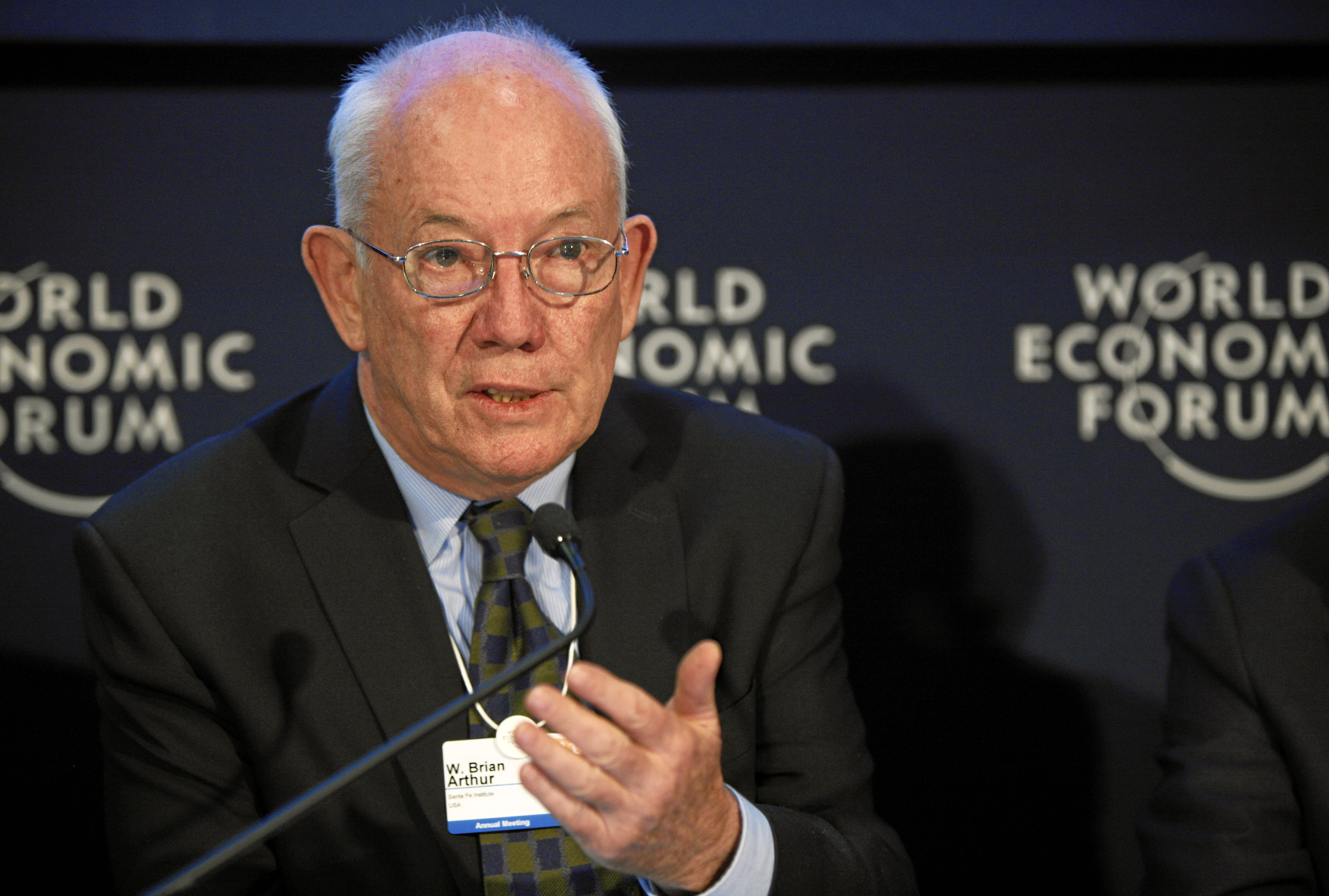W. Brian Arthur in: Mitchell M. Waldrop (2004) Complexity: The Emerging Science at the Edge of Order and Chaos http://books.google.nl/books?id=VP9TWZtVvq8C&pg=PA333. p. 333
Brian Arthur: Citations en anglais
"Coming from Your Inner Self", Conversation with W. Brian Arthur, Xerox PARC (16 April 1999) http://web.archive.org/web/20071011023150/http://www.dialogonleadership.org/Arthur-1999.html, by Joseph Jaworski, Gary Jusela, C. Otto Scharmer
Contexte: Complexity theory is really a movement of the sciences. Standard sciences tend to see the world as mechanistic. That sort of science puts things under a finer and finer microscope. In biology the investigations go from classifying organisms to functions of organisms, then organs themselves, then cells, and then organelles, right down to protein and enzymes, metabolic pathways, and DNA. This is finer and finer reductionist thinking.
The movement that started complexity looks in the other direction. It’s asking, how do things assemble themselves? How do patterns emerge from these interacting elements? Complexity is looking at interacting elements and asking how they form patterns and how the patterns unfold. It’s important to point out that the patterns may never be finished. They’re open-ended. In standard science this hit some things that most scientists have a negative reaction to. Science doesn’t like perpetual novelty.
“Complexity theory is really a movement of the sciences.”
"Coming from Your Inner Self", Conversation with W. Brian Arthur, Xerox PARC (16 April 1999) http://web.archive.org/web/20071011023150/http://www.dialogonleadership.org/Arthur-1999.html, by Joseph Jaworski, Gary Jusela, C. Otto Scharmer
Contexte: Complexity theory is really a movement of the sciences. Standard sciences tend to see the world as mechanistic. That sort of science puts things under a finer and finer microscope. In biology the investigations go from classifying organisms to functions of organisms, then organs themselves, then cells, and then organelles, right down to protein and enzymes, metabolic pathways, and DNA. This is finer and finer reductionist thinking.
The movement that started complexity looks in the other direction. It’s asking, how do things assemble themselves? How do patterns emerge from these interacting elements? Complexity is looking at interacting elements and asking how they form patterns and how the patterns unfold. It’s important to point out that the patterns may never be finished. They’re open-ended. In standard science this hit some things that most scientists have a negative reaction to. Science doesn’t like perpetual novelty.
“[Market outcomes] depends on the cumulation of random events.”
Source: Competing Technologies, Increasing Returns and Lock-in by Historical Events, (1989), p. 124; as cited in: Tobias Georg Meyer (2012) Path Dependence in Two-sided Markets. p. 244
W. Brian Arthur, quoted in "Complex Questions" in Reason magazine (January 1996) http://reason.com/archives/1996/01/01/complex-questions/2, and in Hayek's Challenge : An Intellectual Biography of F. A. Hayek (2005) by Bruce Caldwell
Source: Increasing Returns and Path Dependence in the Economy, (1994), p. 1: Chapter 1. Positive feedback in economics
Source: The Nature of Technology: What It Is and How It Evolves. (2009), p. 11
Source: The Nature of Technology: What It Is and How It Evolves. (2009), p. 10
Source: Increasing Returns and Path Dependence in the Economy, (1994), p. 1: Chapter 1. Positive feedback in economics
Source: Inductive Reasoning and Bounded Rationality (The El Farol Problem) (1994), p. 8
Arthur, W. Brian. "Increasing Returns and the New World of Business." Harvard business review 74.4 (1996): p. 100
Source: Inductive Reasoning and Bounded Rationality (The El Farol Problem) (1994), p. 1
Source: Competing Technologies, Increasing Returns and Lock-in by Historical Events, (1989), p. 116
Source: Competing Technologies, Increasing Returns and Lock-in by Historical Events, (1989), p. 127, as cited in: John Gowdy (1994) Coevolutionary Economics: The Economy, Society and the Environment. p. 148
Source: Increasing Returns and Path Dependence in the Economy, (1994), p. 1: Chapter 1. Positive feedback in economics
p, 128
Competing Technologies, Increasing Returns and Lock-in by Historical Events, (1989)
